Thought leaders series: Building climate resilient infrastructure
Watch the video of Thought leaders series: Building climate resilient infrastructure held on Wednesday 28 April 2021.
How is climate change affecting how we design, plan, build and manage infrastructure?
Globally, the growing intensity and frequency of extreme climate events is leading to catastrophic impacts on infrastructure. Rising temperatures, increased flood risk, bushfires and other severe weather events jeopardise the reliable and efficient operation of this infrastructure.
The decisions about design, planning, building and management will determine how resilient infrastructure is to a changing climate.
So, what does climate resilient infrastructure look like for new and existing structures?
As we look to the future, our expert panel will explore the opportunities and industry challenges involved with building climate resilient infrastructure and focus on the importance of taking action. They will discuss digitalisation and the digital divide, sustainability, and the circular economy.
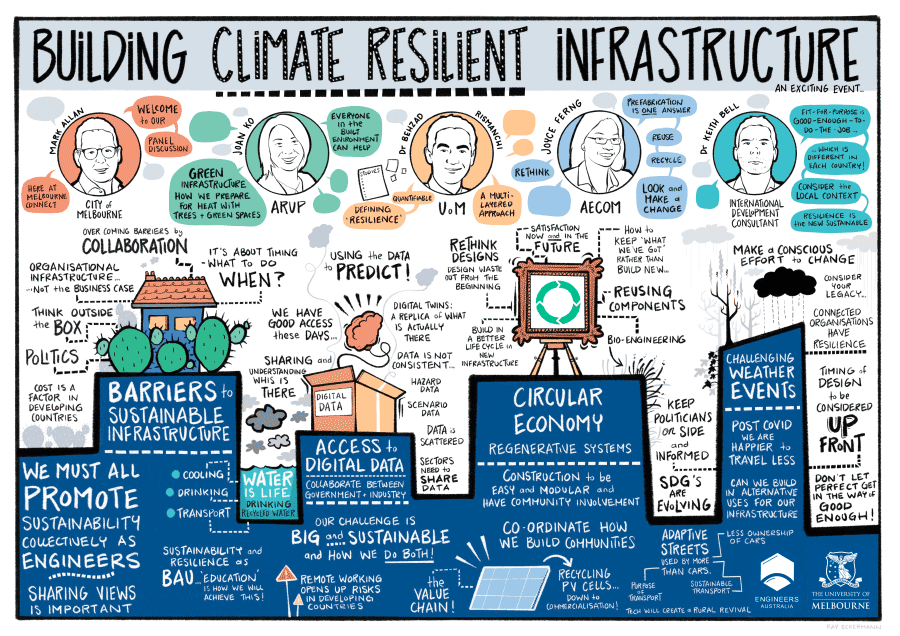
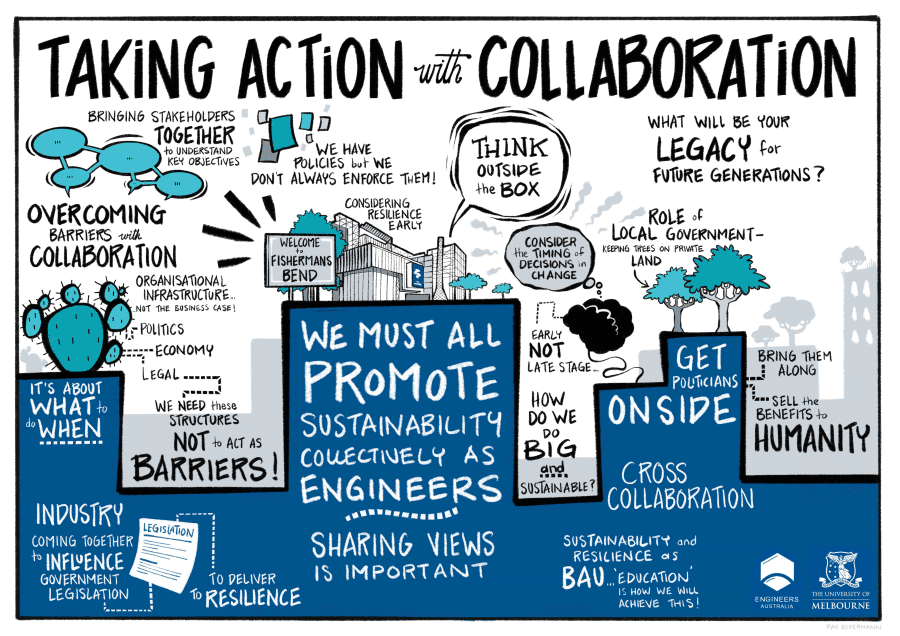
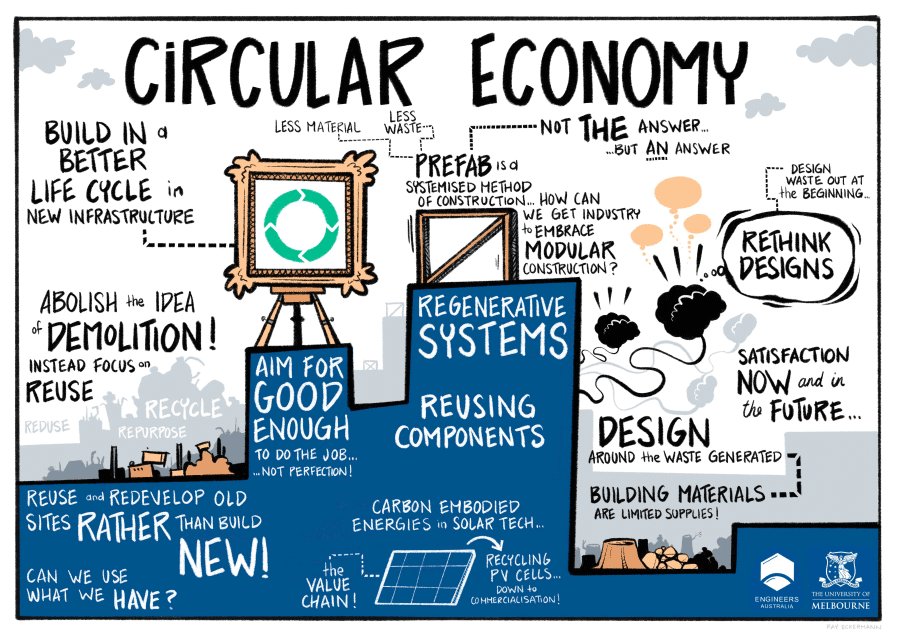
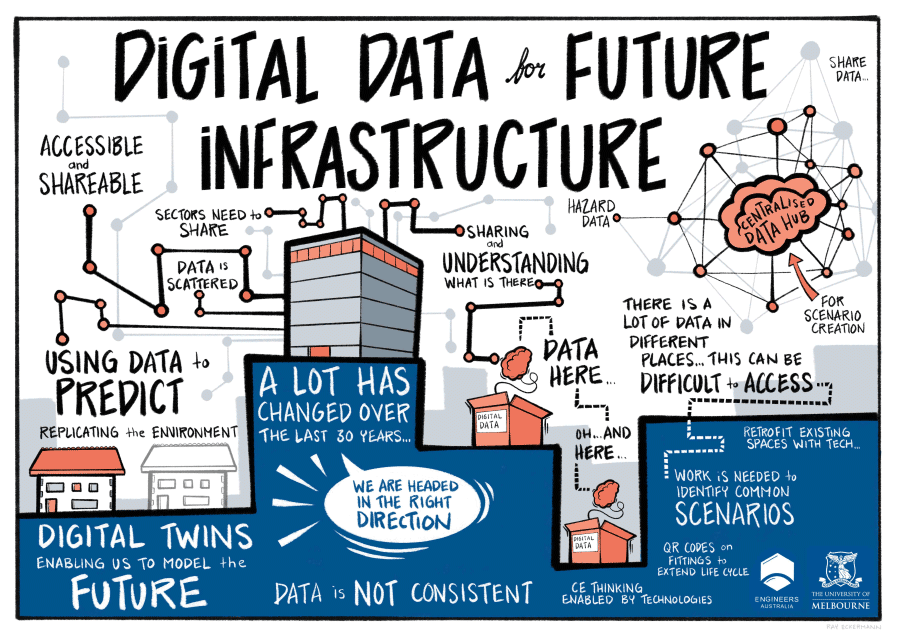
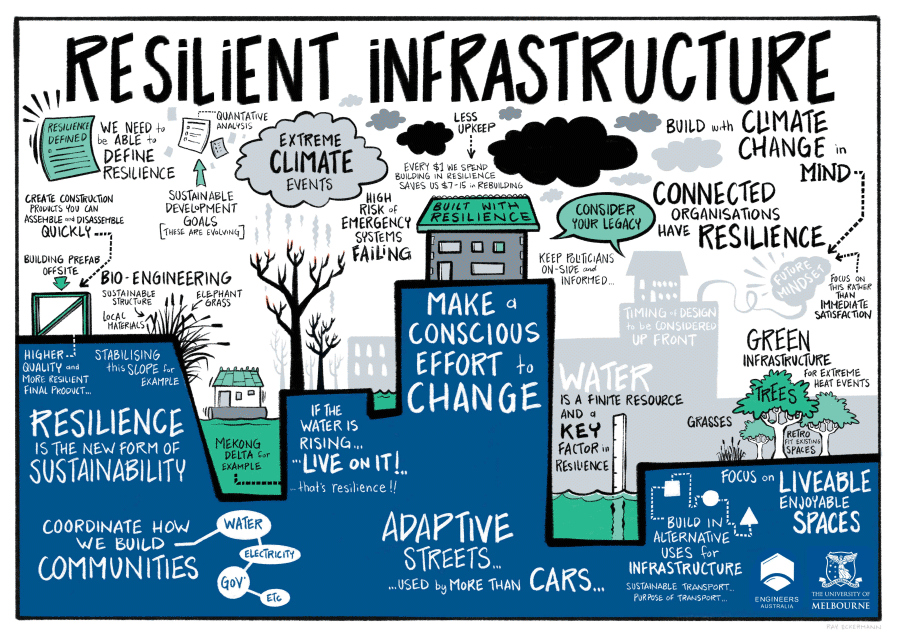
Download a PDF of the overview sketch of discussion
Download a PDF of the topic sketches of discussion
Panelists
Professor Abbas Rajabifard, FIEAust
Director of Smart and Sustainable Development, Program Leader for Infrastructure, The University of Melbourne
Professor Abbas Rajabifard is an internationally recognised scholar and geospatial engineer. He is an active leader in land system modernisation, sustainability and resilience, and digital twin development for the urban system. He is passionate about research and innovation to serve a global community. Abbas has led multiple projects to improve urban land systems, 3D cadastre, and resilience impact. Particularly in the Asia-Pacific, Europe, North America and Latin America, he has developed the strategy, design and implementation of policies, technologies and applications in a wide variety of subject areas, including housing and urban planning, transportation systems and disaster management. He is currently a Board member of the United Nations-Academic Network for Global Geospatial Information Management (UN-GGIM).
Joan Ko
Advisory, Planning and Design – Victoria Lead, Arup
Joan Ko is one of Arup’s global sustainability leaders, based in Melbourne. Joan focuses on the human and economic dimensions of resilience in the built environment. Her work moves infrastructure owners and operators beyond risk assessment towards making real progress on adaptation and preparedness. Recently, Joan worked with the Department of Health on its first climate change adaptation plan, and with Infrastructure Australia to understand the role of infrastructure in community resilience. Joan is also appointed to several Victorian government committees that advise on preparing Victoria for climate change and transitioning to a circular economy.
Dr. Keith Clifford Bell, RFD
International Development Consultant
Dr Keith Bell recently retired from the World Bank in April 2021 after 18 years of leading international development and humanitarian engineering programs for land, national spatial data infrastructure, disaster response risk management and resilience. Based in Bangkok, he currently worksas an independent consultant and is an advisor to the University of Melbourne’s Center for Spatial Data Infrastructures and Land Administration. He has worked in more than 35 countries, leading programs in conflict and fragile states, including post-disaster reconstruction. Prior to the World Bank he worked in the Australian public sector and army for 25 years. He is a co-author of the international development flagship publication Fit-for-Purpose Land Administration (2013) published by the International Federation of Surveyors and the World Bank. He is both a Chartered Professional Engineer and a Licensed Surveyor in Victoria.
Dr Behzad Rismanchi
Lecturer at Department of Infrastructure Engineering, The University of Melbourne
Dr Behzad Rismanchi is a lecturer at the Department of Infrastructure Engineering, he is a professional member of Engineers Australia (MIEAust), Certified Measurement & Verification Professional (CMVP), Green Star Associate professional (GSAP), and certified energy manager (CEM). He has over10 years’ experience in research, design, and optimisation of energy systems, working across all aspects of the project lifecycle. Behzad is particularly skilled in energy management systems, energy for sustainable development, the internet of things and human thermal comfort.
Joyce Ferng
Associate Director – ANZ Modular Lead, AECOM
Joyce Ferng has been delivering complex and challenging projects across Australia, United Kingdom and Singapore for over 20 years as a chartered professional engineer, in collaboration with renown international architects like Zaha Hadid and Lord Norman Foster. She implements innovative and economicalsolutions to project challenges and is passionate about pushing the boundaries of modular technologies. With her experience and expertise in Systemised Technology, Joyce is leading the AECOM modular initiatives working closely with digital disruptors to integrate technologies from Industry 4.0 with established lean methodologies in the construction prefabrication space. Joyce is an Adjunct Industry Fellow with Swinburne University and an Industry Technical Advisor to the University of Melbourne’s Centre for Advanced Manufacturing of Prefabricated Housing. She is also on the board of directors for PrefabAUS,a hub advocating prefabrication in Australia.
Mark Allan
Acting Director City Design, City Design Studio, City of Melbourne
Mark Allan is a registered architect and qualified urban planner with a Master’s degree from the Melbourne Business School. With a career spanning 30 years in sustainable urban development and major urban renewal projects, Mark has played key roles in the planning and design of FederationSquare, Melbourne Docklands and the Queen Victoria Market Precinct Renewal. In his current role at the City of Melbourne he is Acting Director City Design where he leads Council’s City Design Studio. Mark has previously held senior roles in architectural practice and at Mirvac, VicUrban andthe former Melbourne Docklands Authority. He is a Fellow of the Australian Institute of Architects and the Planning Institute of Australia and an Honorary Fellow of the University of Melbourne’s Infrastructure Engineering Department. Mark has particular expertise in urban renewal projectsand the design of sustainable precincts.